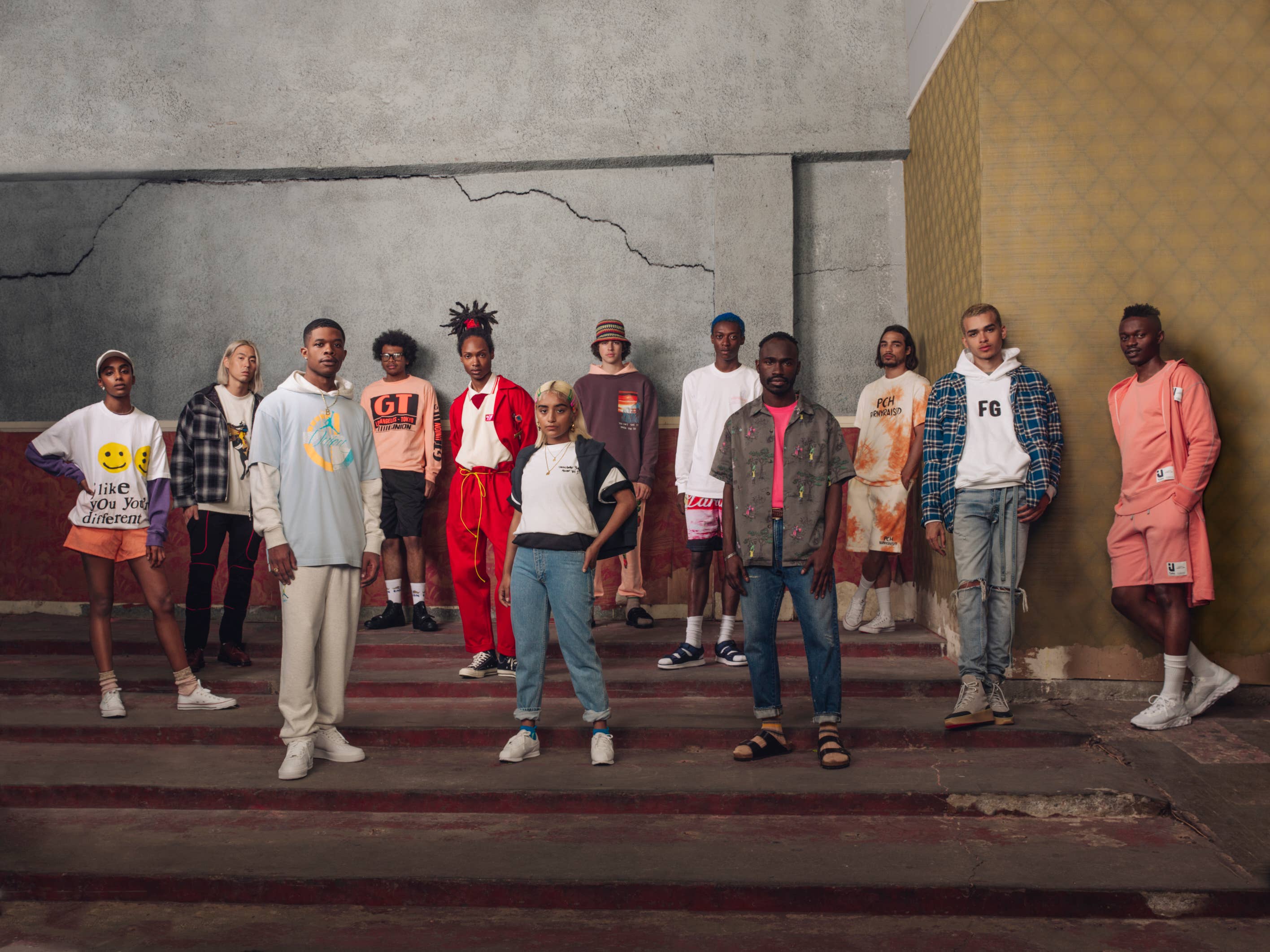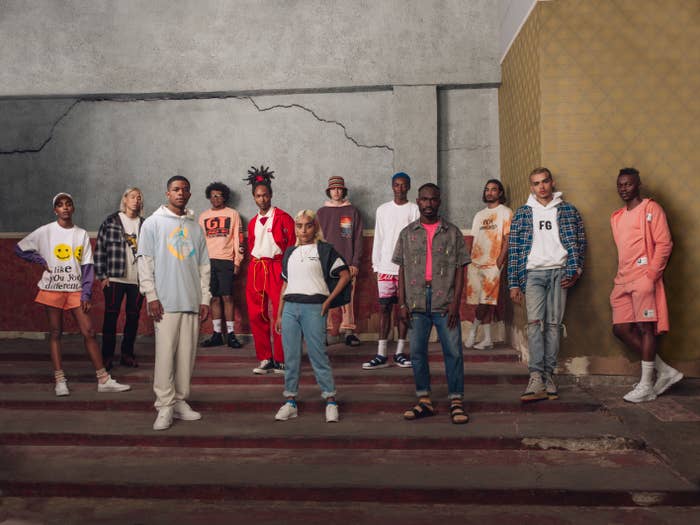
According to Chris Gibbs, Union Los Angeles was always meant to be an alternative to department stores.
“We are a place for young, independent designers to hopefully make and break themselves. And, historically, that hasn’t been what department stores do,” says Gibbs over the phone.
But Gibbs isn’t so sure if those old rules still apply, and he’s not so sure if being L.A.’s best-kept secret is completely healthy for his store, which is one of the reasons why he agreed to partner with Nordstrom for Concept 005: Union & Company, a pop-up shop located within eight of Nordstrom’s key stores, and online, that was curated by Gibbs and Sam Lobban, Nordstrom’s vice president of men’s fashion.
This is the first time Union Los Angeles has worked with a larger retailer. The shops will be open through September 1 and feature exclusive product from 13 brands, including Union, Awake NY, BornxRaised, Cactus Plant Flea Market, Camp High, Fear of God, Jordan Brand, Marni, Neighborhood x Converse, No Vacancy Inn, Our Legends, Reigning Champ, and Rhude.
“What we're trying to do with Concepts is tell some of the most interesting and compelling brand and product stories in the men’s market,” says Lobban. “If you sort of trace that line back, Chris is one of the forerunners with Union in regards to the merging of streetwear, designer wear, work wear, and Japanese brands. I have a huge amount of respect for him and his take on product, and that's the thing I thought would be super interesting and compelling for a Nordstrom customer to experience.”
In a lot of ways, the evolution of Chris Gibbs’ career does mirror the evolution of streetwear and menswear. Gibbs started out working under Supreme founder James Jebbia and Mary Ann Fusco at Union’s New York location in 1996, when it was selling mostly T-shirts, sneakers, and sweatshirts. He moved to California to work for the Union Los Angeles shop, which was then owned by Undefeated’s Eddie Cruz. At that time, the Los Angeles store started to integrate more Japanese streetwear brands into the mix, which allowed customers to become better acclimated with higher price points. And because of this, in 2008, when Gibbs purchased the store from Cruz, he began selling more higher-end designers, including Marni and Thom Browne. Now Gibbs is selling his own brand, along with a new category of brands like Fear of God and Off-White that he describes as streetwear that’s highly inspired by high fashion.
“I’ll be honest, I couldn’t have predicted Off-White,” says Gibbs. “I couldn’t have predicted 10 years ago that we would be selling Thom Browne or Comme des Garçons. But I like that. And I think that's what's allowed us to keep the doors open, keep the lights on, and be relevant for almost 30 years, because we've been able to evolve with the fashion.”
Here, Gibbs talks the future of Union, how he feels about luxury’s interpretation of streetwear, the impact of his collaboration with Jordan Brand, and what brands need to succeed today.
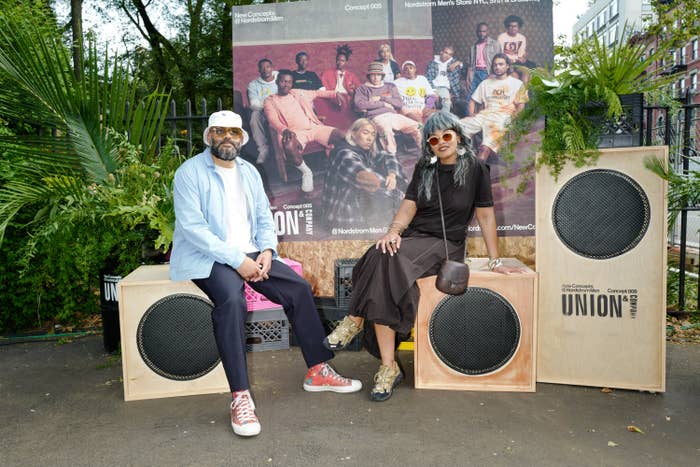
You started out in New York, and now you’re kind of back with this partnership. Have you ever considered opening a store here, since Union was founded here but is no longer open?
Yes, I have. That's the easy answer. I would love to have a presence in New York. To me, it’s kind of the birthplace of the brand. But I don’t know. It’s complicated. The history of the brand, as I kind of explained it to you before, adds wrinkles to if, how, and when I can move it back. I guess this exercise is going to go a long way toward proving my curiosity to see if what we’re doing would be appreciated here.
What did you learn about running a store from Mary Ann Fusco, James Jebbia, and Eddie Cruz?
Damn near everything. Almost every decision I make for Union goes through a little filter in my head of, what would either Mary Anne, James, or Eddie have done in this situation? Those were my mentors. But one of the main lessons is to make decisions from the standpoint of the customer. That might sound silly, but I think historically the industry wasn’t doing that. A designer usually dictates their vision to the world and hopes that someone else appreciates it.
And I think that’s really cool, don’t get it twisted, but what I learnt through them was to think what the consumer would want and appreciate first, and kind of reverse engineer the product that we’re offering to fit what they want. Like, “Hey, this is what the streets are doing right now, the streets are really into this, so let’s go get it for them.”
Unfortunately it’s very rare that the product itself is going to be able to sell or get into the mind or on the body of the consumer. It’s kind of got to be a holistic approach at this point. And right now the marketing, the story, the provenance of the brand is important. —Chris gibbs
What do you think about how luxury has interpreted streetwear? You mentioned not carrying certain luxury brands like Balenciaga that are dipping into streetwear in some type of way. Why do you stay away from those brands?
It’s complicated. There was a time where we actually tried to do that. We tried to bring that in, and we found that it didn't fit. I think those brands in particular aren’t exactly what Union is about. They’re part of a bigger machine. Streetwear is hot right now, so that’s what they’re going to do. But in two years it could be something very much different, and those brands have, like, 80-plus or whatever years where they’re going to switch and it won’t necessarily fit within Union. It’s nothing against the brands. And I’ll say on the flip side, with respect to those brands, a lot of them also don’t really understand who we are. So it doesn’t work for them, either.
You’ve said before that the success of a brand has more to do with the story the designer tells rather than the clothes. Do you still agree?
Yeah. As men’s fashion, streetwear in particular, as it evolved, you’re now not wanting for clothing. It’s not like, “Oh, there’s this thing I want and I can't find it out there.” It’s out there. It’s out there in abundance. So the competition is greater than ever. I would almost call it a critical mass as we speak of good product out there. Unfortunately it’s very rare that the product itself is going to be able to sell or get into the mind or on the body of the consumer. It’s kind of got to be a holistic approach at this point. And right now the marketing, the story, the provenance of the brand is important. You kind of got to be coming with your own story, and people are buying into that. Then people will buy into like unique story.
Do you think that will change?
I think it’ll change, but I don’t think it's going to go backwards. I think it’s going to become more hyper-specific and tell a very particular story that comes from a very particular design point of view. The designs, not that they should be shitty, but the designs don’t have to be great if the story’s great. You know what I mean?
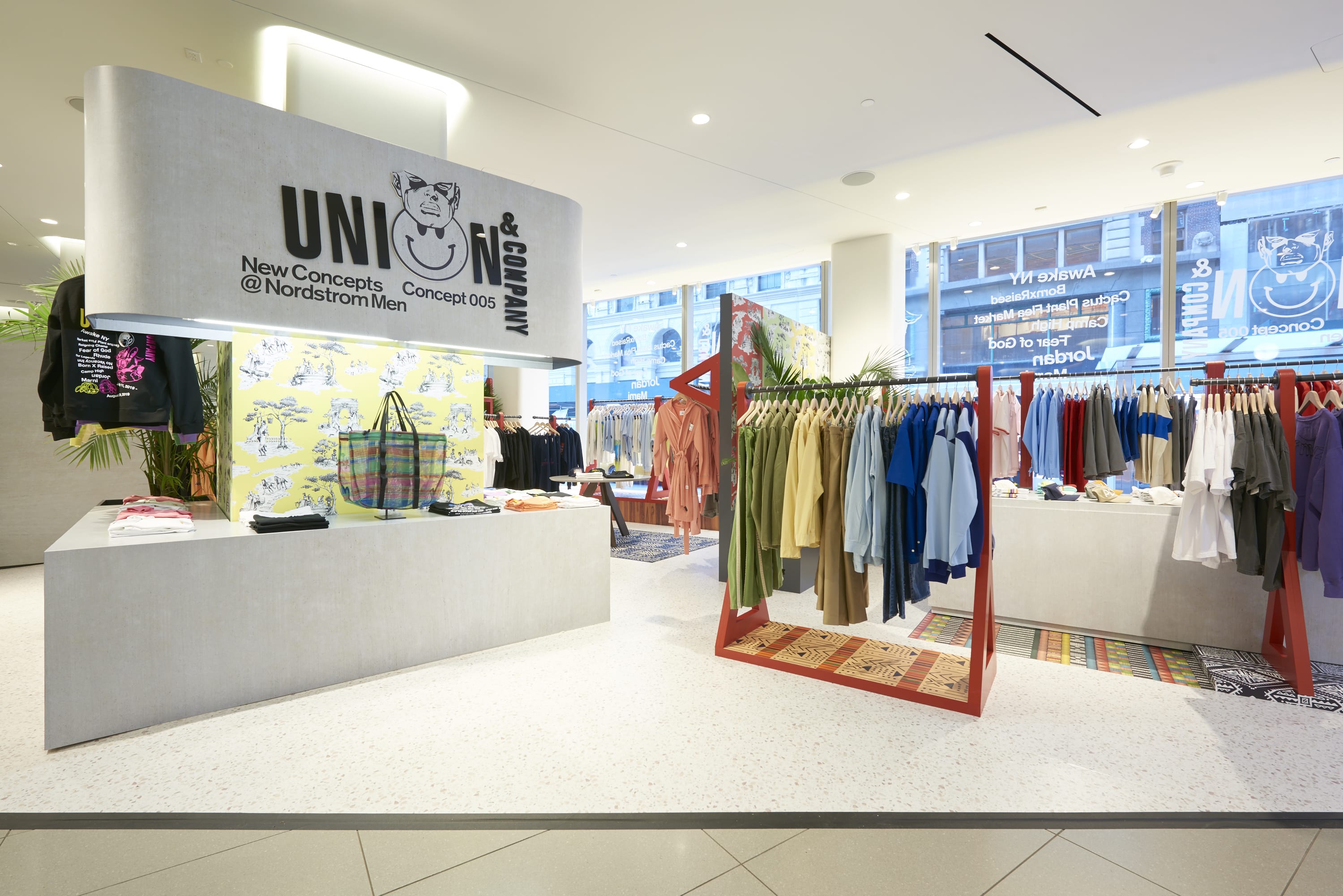
Does that bother you?
It used to bother me a lot because I’d be seeing really good product that isn’t resonating because they don’t know or haven’t found a good way to tell the story. And thus it’s not connecting with the consumer because that brand couldn’t tell their story better. It used to really bother me because there wasn’t as much good product as there is in the marketplace now.
But I think inevitably that’s kind of how things are evolving, and then everybody’s got to get on with it, including us. We’ve got to tell our story and again, to bring it full circle. That’s why we’re doing this Nordstrom’s exercise. We’ve got to make sure that our voice is being heard, and sometimes we’re, like, the best-kept secret in L.A., and I don't think that's completely healthy for us.
Well, how do you translate that storytelling to your private label? Because I know that's something that you've said has been challenging.
I'll be honest. If I had to pinpoint one area that needs more work, it’s that. We’ve always sold other people’s stories. It’s a lot different to tell your own, and that’s something that I’m working on. So I’m giving people the same advice that I’m trying to learn and do on my own. I’m a really good curator and really good editor of other people’s shit. But now I’m in this space where I have to produce my own, and that’s a very different challenge. I’m up to it. I’m excited about it. But it’s definitely this new thing where I’m kind of having to take my own advice, and it ain’t easy.
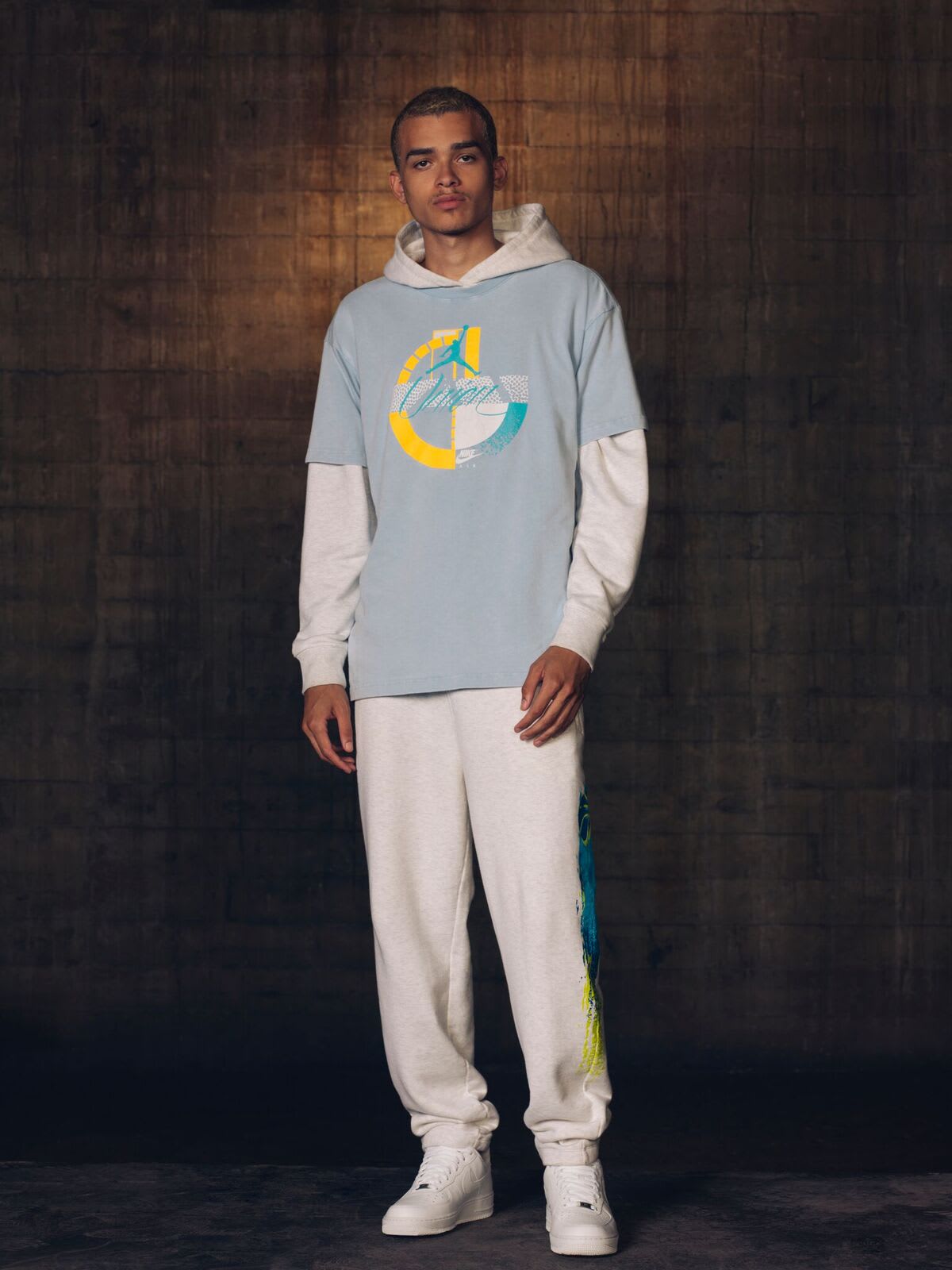
How did the Jordan collab impact things?
That is still happening. I mean, I think because we’re so small, the data is still being crunched, and probably will be crunched for some time to come. It’s funny you ask that question because I was just in Japan and I was talking to a friend of mine who works a lot with the Korean market, and he said a lot of people are asking about Union now that haven’t before and everyone thinks I’m a sneaker designer.
So it’s funny. And much like the Nordstrom thing, we were maybe speaking to a different customer than we usually do—a little less so with Jordan than Nordstrom, but still, like, there’s a Jordan kid who’s never heard of Union. But I had to remind the Jordan team that, yes, they are a basketball brand, but it’s been co-opted by streetwear. Which is why Jordan and Union and streetwear go hand in hand.
Will there be another Jordan x Union partnership?
It will continue. We’ve submitted designs for both apparel and for footwear, and, as you know, the Jordan and Union apparel continues through our Nordstrom opportunity. We did apparel only because by the time we started having the Nordstrom conversations in December, it was too late to do a shoe. But we started working on a whole new apparel and footwear collection that is scheduled to launch at this time next year.
Are you able to say the Jordan silhouette you are working on?
I’ll say this: We're definitely circling the wagons around the Jordan 4s. It’s not 100 percent confirmed yet, but that’s kind of where it’s at. And for the apparel, I’m happy with what we’ve done so far, but I’m really trying to push a little more, and I’ve got a little bit more freedom there because of the success of the first collection. What I’ve designed and proposed is a bit more risky, but we’ll see. I’m excited.
You have a store in Tokyo, do you want to open more?
At the end of the day, the simplest version of what we do is selling other people's brands, and, in this day and age, those brands are largely accessible on a global scale; even we have a website where wherever you are in the world, Iceland, Zimbabwe, whatever, you can go on Union.com and get what we're selling. So, that puts less of a strain on me really needing to have stores in other places. That competitive advantage that we used to have, of having a lot of exclusive product, has waned a little bit with the internet. We just have to pivot and for me that's making our own product. I think as that line grows, so will our outposts, that will be the reason the main impetus behind us doing more retail in New York, or London, or Korea, or so on and so forth.

